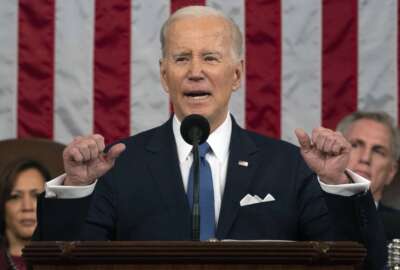- The Biden administration is stepping up plans to crack down on pandemic relief fraud. President Joe Biden said he is doubling down on efforts to prosecute fraudsters who stole COVID-19 relief funds. That is out of the $5 trillion (in total) appropriated by Congress. In his State of the Union address, Biden called for tripling the anti-fraud strike force that is going after criminals and extending the statute of limitations for watchdogs to go after pandemic unemployment insurance fraud from five years to 10 years. Biden said agency watchdogs still need robust funding to go after pandemic fraud. “The data shows that for every dollar we put into fighting fraud, the taxpayers get back at least 10 times as much," Biden said. Agency watchdogs estimate the total amount of pandemic fraud is currently in the tens of billions of dollars.
- Agencies are lagging on some critical cybersecurity recommendations and have yet to act on 60 recommendations for improving the cybersecurity of U.S. critical infrastructure. The Government Accountability Office said some of those ideas date back to 2010. They include a recommendation for the Energy Department to address risks to electric power distribution systems. And the Cybersecurity and Infrastructure Security Agency has yet to evaluate whether it is providing effective support to the communications sector. Until agencies address the recommendations, GAO said critical infrastructure sectors will continue to face increased cyber risks to systems and data.
- A senator is reemphasizing calls to restrict the Thrift Savings Plan's investments. Sen. Marco Rubio (R-Fla.) has reintroduced a bill that would prevent the TSP from investing in Chinese military companies. The TSP Fiduciary Security Act would also require the Federal Retirement Thrift Investment Board — the agency in charge of the TSP — to review compliance with the departments of Labor, Defense and Homeland Security. Rubio introduced the bill last Congress, but it was not considered.
- The White House is seeking bipartisan help from Congress to support veterans. The Biden administration is promoting its goals for the Department of Veterans Affairs as an area of bipartisan compromise in a divided Congress. The White House said the VA is on track to hire 280 “peer specialists” by the end of 2023. Those are veterans with mental health experience, who are trained to assist other veterans going through mental health challenges. The VA processed an all-time record of 1.7 million veteran claims in 2022. It also delivered $128 billion dollars in benefits to veterans and their families. President Joe Biden said the VA is also addressing veteran suicide. “VA’s doing everything it can, including expanding mental health screening,” Biden said.
- A new bill would give federal employees more paid leave during medical crises. Lawmakers have introduced legislation to guarantee 12 weeks of paid time off for feds when dealing with long-term medical issues. The bill would also apply for individuals who need to take time off to assist family members with a medical crisis. The 12 paid weeks kick in once a federal employee has been working at least a year in government. The National Federation of Federal Employees and the National Treasury Employees Union quickly endorsed the bill, called the Comprehensive Paid Leave for Federal Employees Act.
- GSA is expanding its data reporting initiative beyond the schedules program. Transactional Data Reporting (TDR) is now available to vendors on GSA's multiple award and governmentwide acquisition contracts. A new acquisition memo from GSA details how contracting officers can insert new language into existing contracts. Under TDR, GSA collects a wide variety of data including prices paid per unit, quantity of item sold and total price paid to help better understand the cost of products and services. GSA applied TDR previously only to the schedules program to help alleviate the burden of the Price Reduction Clause.
- The Justice Department's recoveries under the False Claims Act hit just over $2.2 billion in 2022. The law imposes damages and penalties on those who knowingly and falsely claim money from the United States. Healthcare fraud continues to be the largest source of False Claims Act recoveries, totaling more than $1.7 billion last year.
- The National Science Foundation wants public input on the future of federal cybersecurity research and development. The NSF published a request for information this week to help it update the federal cybersecurity R&D strategic plan. The last version of the plan was released in 2019. Ahead of this year’s update, the NSF wants information on relevant advancements in the cybersecurity field over the last four years. It also wants to know what research topics should continue to receive federal R&D funding. Comments are due by March 3.
- Cyber Command at Fort Meade has a new senior enlisted leader. Air Force Chief Master Sgt. Kenneth Bruce will take over from Army Command Sgt. Maj. Sheryl Lyon. Bruce is currently assigned as the Command Chief Master Sgt. of the Sixteenth Air Force, Air Forces Cyber at Joint Base San Antonio-Lackland in Texas. Cyber Command focuses on defending DoD’s network, offering mission support, and strengthening U.S. networks against cyber attacks.
- A decade-long plan for the IRS to modernize a key component of its legacy IT is falling behind. The Government Accountability Office has found the IRS recently suspended two modernization initiatives essential to replacing the 60-year old Individual Master File (IMF). The IMF is the IRS’s authoritative data source for every individual taxpayer. IRS officials told GAO that they suspended work on the projects to shift resources to higher priorities. Last year, the IRS said it hoped to replace the IMF by 2030, but GAO concluded that timeline is now less clear.
- MREs of the future could be made from nothing more than water, air and energy. The Defense Advanced Research Projects Agency (DARPA) announced it contracted with vendors to make a variety of healthy new microbial-based foods using just those three ingredients. The food, called microbial biomass, consists of all four human dietary needs — protein, carbohydrates, fat and fiber — in ratios that target military-mandated daily requirements for nutrition. The food will be made into recognizable substances like shakes, bars, gel or jerky. DARPA has four partners working on the project, including Johns Hopkins Applied Physics Lab.
Copyright
© 2024 Federal News Network. All rights reserved. This website is not intended for users located within the European Economic Area.


